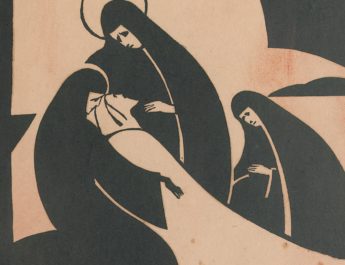Romans 6:1-14
Narrative Lectionary 145
1 What then are we to say?A Should we continueB in sinC
A “say” = ereo. Perhaps from rheo (to say, speak of, command). This is to say, tell, speak, mean, command.
B “continue” = epimeno. 17x in NT. From epi (on, upon, what is fitting) + meno (to stay, remain, wait, await, continue, abide, endure; to literally stay in a place or to remain in a condition; to continue with hope and expectation). This is to remain, terry, continue, or persevere. It denotes persistence in pursing a goal or task.
C “sin” = hamartia. From hamartano (to miss the mark, do wrong, make a mistake, sin); {from a (not) + meros (a part or share)}. Literally, this means not having one’s share or portion – like not receiving inheritance or what was allotted to you. This word means missing the mark so it is used for guilt, fault, and acts of sin.
in order that graceD may increase?E 2 By no means!F How can we who diedG to sin go on livingH in it?
D “grace” = charis. From chairo (to rejoice, be glad; used to say hello; properly, delighting in the grace of God or experiencing God’s favor); from char– (to extend favor, lean towards, be inclined to be favorable towards). This is grace, kindness, favor, gratitude, thanks. It is the sense of being inclined to or favorable towards – leaning towards someone to share some good or benefit. This can be literal, figurative, or spiritual. It is grace as abstract concept, manner, or action.
E “increase” = pleonazo. 9x in NT. From pleion (many, more, great, having a greater value, more excellent); from polus (much, many, abundant). This is to abound, increase, to superabound. It shares a root with “pleonasm.”
F “by…means” = ginomai. This is to come into being, to happen, become, be born. It can be to emerge from one state or condition to another or is coming into being with the sense of movement or growth.
G “died” = apothnesko. From apo (from, away from) + thnesko (to die, be dead). This is to die off. It is death with an emphasis on the way that death separates. It can also mean to wither or decay.
H “living” = zao. This is to live literally or figuratively. It is used for life including the vitality of humans, plants, and animals – it is life physical and spiritual and life everlasting.
3 Do you not knowI that all of us who were baptizedJ into ChristK JesusL were baptized into his death?M
I “not know” = agnoeo. From a (not) + noieo (to perceive, think, understand); {from nous (mind, understanding, reasoning faculty, intellect, capacity to reflect); from noos (mind); probably from the base as ginosko (to know, recognize, realize, perceive, learn; gaining knowledge through personal experience)}. This is unaware not to know. Sometimes it is willful ignorance, but other times it is simply not knowing.
J “baptized” = baptizo. From bapto (to dip or dye; to entirely cover with liquid, to stain). This is to submerge, wash, or immerse. Used specially for baptism.
K “Christ” = Christos. From chrio (consecrate by anointing with oil; often done for prophets, priests, or kings). Literally, the anointed one, Christ. The Greek word for Messiah.
L “Jesus” = Iesous. From Hebrew Yehoshua (Joshua, the Lord is salvation); {from YHVH (proper name of the God of Israel; the self-existent and eternal one); {from havah (to become) or from hayah (to come to pass, become, be)} + yasha (to deliver, defend, help, preserve, rescue; properly, to be open, wide or free, which implies being safe. So, in a causative sense, this is to free someone)}. This is Jesus or Joshua in Greek – the Lord saves or the Lord is salvation.
M “death” = thanatos. Related to “died” in v2. From thnesko (see note G above). This is death, whether literal or spiritual. It can also refer to something that is fatal.
4 Therefore we were buriedN with him by baptismO into death, so that, just as Christ was raisedP from the deadQ
N “buried” = sunthapto. 2x in NT. From sun (with, together with) + thapto (to bury, conduct funeral rites). This is to bury with.
O “baptism” = baptisma. Related to “baptized” in v3. From baptizo (see note J above). This is dipping or sinking. Also, the rite of baptism.
P “raised” = egeiro. This is to awake, raise up or lift up. It can be to get up from sitting or lying down, to get up from sleeping, to rise from a disease or from death. Figuratively, it can be rising from inactivity or from ruins.
Q “dead” = nekros. Perhaps from nekus (corpse). This is dead or lifeless, mortal, corpse. It can also be used figuratively for powerless or ineffective. It is where the word “necrotic” comes from.
by the gloryR of the Father,S so we also might walkT
R “glory” = doxa. From dokeo (to have an opinion, seem, appear, suppose; a personal judgment; to think); from dokos (opinion). This is literally something that evokes a good opinion – something that connects to our understanding of intrinsic worth. The ultimate expression of this is, of course, God and God’s manifestation. So, this is opinion, honor, and dignity, but also praise, glory, renown, and worship.
S “Father” = Pater. This is father in a literal or figurative sense. Could be elder, senior, ancestor, originator, or patriarch.
T “walk” = peripateo. From peri (about, concerning, around, encompassing) + pateo (to read, trample on; to trample literally or figuratively); {from patos (trodden) OR from paio (to strike, smite, sting; a hit like a single blow)}. This is to walk. Going from Hebrew figurative language, to walk referred to how you conducted your life, how you chose to live. This word is most literally walking around. Figuratively, it is living, behaving, following, how you occupy yourself. This is where “peripatetic” comes from.
in newnessU of life.V 5 For if we have beenW unitedX with him
U “newness” = kainotes. 2x in NT. From kainos (not new as in new versus old; new in the sense of novel, innovative, or fresh). This is newness, novelty, or renewal.
V “life” = zoe. Related to “living” in v2. From zao (see note H above). This is life including the vitality of humans, plants, and animals – it is life physical and spiritual and life everlasting.
W “been” = ginomai. Same as “by…means” in v2. See note F above.
X “united” = sumphutos. 1x in NT. From sumphuo (to grow together, spring up with); {from sun (with, together with) + phuo (to grow, spring up, puff, swell up, germinate)}. This is united or grown together – closely united.
in a death likeY his, we will certainly beZ united with him in a resurrectionAA like his.
Y “like” = homoioma. 6x in NT. From homoioo (to compare, liken, resemble, become similar); from homoios (similar to, resembling, like); from the same as homou (together); from homos (the same). This is resembling, likeness, form, or appearance.
Z “be” = eimi. This is to be, exist.
AA “resurrection” = anastasis. From anistemi (to raise up, rise, appear; to stand up literally or figuratively. Can also mean to resurrect); from ana (upwards, up, again, back, anew) + histemi (to make to stand, place, set up, establish, appoint, stand by, stand still, stand ready, stand firm, be steadfast). This is literally standing up or standing again. It is used figuratively for recovering a spiritual truth. It can be raising up, rising, or resurrection.
6 We knowBB that our oldCC selfDD was crucified withEE him
BB “know” = ginosko. Related to “not know” in v3. See note I above.
CC “old” = palaios. 19x in NT. From palai (former, of old); probably from palin (back, again, further). This is old, ancient, or worn out.
DD “self” = anthropos. Probably from aner (man, male, husband) + ops (eye, face); {from optanomai (to appear, be seen); perhaps from horao (become, seem, appear)}. This is human, humankind. Used for all genders.
EE “crucified with” = sustauroo. Related to “resurrection” in v5. 5x in NT. From sun (with, together with) + stauroo (to attach someone to a cross or fencing with stake; figuratively, to destroy, mortify, or subdue passions/selfishness); {from stauros (upright stake, cross; literally the horizontal beam of a Roman cross, generally carried by the one convicted to die); from the same as histemi (see note AA above)}. This is to crucify together. It could be literal or figurative.
so that the bodyFF of sin might be destroyed,GG so we might no longer be enslavedHH to sin.
FF “body” = soma. Perhaps from sozo (to save, heal, rescue); from sos (safe, well, rescued). This is body or flesh. It can be body in a literal or figurative sense (as the body of Christ). This is where the word “somatic” comes from.
GG “destroyed” = katargeo. From kata (down, against, according to, among) + argeo (to delay, linger, be at rest, be idle, do nothing); {from argos (inactive, idle, lazy, thoughtless, useless, unemployed, unprofitable) {from a (not) + ergon (word, task, action, employment)}}. This is making something inactive or bringing it to nothing. So, it could mean making something inoperative or powerless, annulling, or severing. It can also mean to make something ineffective or invalid.
HH “enslaved” = douleuo. From doulos (a servant or for a slave, enslaved; someone who belongs to someone else, but could be voluntary to pay off debt or involuntary – captured in war and enslaved; a metaphor for serving Christ); perhaps from deo (to tie, bind, fasten, impel, compel; to declare something against the law or prohibited). This is to be a slave, serve, do service, obey, be devoted.
7 For whoever has died is freedII from sin. 8 But if we died with Christ, we believeJJ that we will also live withKK him.
II “freed” = dikaioo. From dikaios (correct, righteous – implies innocent; this is that which conforms to God’s notion of justice, uprightness); From dike (the principle of justice; that which is right in a way that is very clear; a decision or the execution of that decision; originally, this word was for custom or usage; evolved to include the process of law, judicial hearing, execution of sentence, penalty, and even vengeance; more commonly, it refers to what is right); may be from deiknumi (to show, point out, exhibit; figurative for teach, demonstrate, make known). This is to be righteous, plead the cause of, justify, acquit. Properly, it is being approved, particularly carrying the weight of a legal judgment. It is upright, render just, or innocent.
JJ “believe” = pisteuo. From pistis (faith, faithfulness, belief, trust, confidence; to be persuaded or come to trust); from peitho (to have confidence, urge, be persuaded, agree, assure, believe, have confidence, trust). This is to believe, entrust, have faith it, affirm, have confidence in. This is less to do with a series of beliefs or doctrines that one believes and more to do with faithfulness, loyalty, and fidelity. It is trusting and then acting based on that trust.
KK “live with” = suzao. Related to “living” in v2 & “life” in v4. 3x in NT. From sun (with, together with) + zao (see note H above). This is to live with or co-survive. It can be literal or figurative.
9 We knowLL that Christ, being raised from the dead, will never die again; death no longer has dominion overMM him. 10 The death he died, he died to sin once for all,NN but the life he lives, he lives to God.OO
LL “know” = eido. This is to know, consider perceive, appreciate, behold, or remember. It means seeing with one’s eyes, but also figuratively, it means perceiving – seeing that becomes understanding. So, by implication, this means knowing or being aware.
MM “has dominion over” = kurieuo. 7x in NT. From kurios (a respectful address meaning master or sir. It refers to one who has control or power greater than one’s own. So, it was also applied to God and Jesus as Master or Lord); from kuros (authority, supremacy). This is to be lord of, rule, lord over.
NN “once for all” = ephapax. 5x in NT. From epi (on, upon, what is fitting) + hapax (once, once for all); {from a (with – signifying fellowship) + pag-} or {from hapas (all; every part working together as a unit); from hama (at once, together with) + pas (all, every, every kind of) or from a (with) + pas (all, every)}. This is once for all, at once, one time.
OO “God” = Theos. From Proto-Indo-European origins, meaning do, put, place. This is God or a god in general.
11 So you also must considerPP yourselvesQQ deadRR to sin and aliveSS to God in Christ Jesus.
PP “consider” = logizomai. From logos (word, statement, speech, analogy; here, word as an account or accounting; can also be a word that carries an idea or expresses a thought, a saying; a person with a message or reasoning laid out in words; by implication, a topic, line of reasoning, or a motive; can be used for a divine utterance or as Word – Christ); from lego (to speak, tell, mention). This is this is to compute or reckon up, to count; figuratively, it is coming to a conclusion or decision using logic; taking an inventory in a literal or figurative sense.
QQ {untranslated} = eimi. Same as “be” in v5. See note Z above.
RR {untranslated} = men. This is truly, indeed, even, in fact. Often, it is not translated, but used to emphasize affirmation.
SS “alive” = zao. Same as “living” in v2. See note H above.
12 Therefore do not let sin reignTT in your mortalUU bodies, so that you obeyVV their desires.WW
TT “reign” = basileuo. From basileus (king, emperor, sovereign); probably from basis (step, hence foot; a pace); from baino (to walk, to go). This is to reign as king, to rule in a literal or figurative sense.
UU “mortal” = thnetos. Related to “died” in v2 & “death” in v3. 6x in NT. From thnesko (see note G above). This is moral, able to die.
VV “obey” = hupakouo. From hupo (by, under, about, subordinate to) + akouo (listen, hear, understand through hearing). This is to listen, to attend to, or obey. It is acting subordinate to one who speaks – heeding a command or authority.
WW “desires” = epithumia. From epithmueo (long for, set one’s heart on, yearn, desire); {from epi (on, upon, at, what is fitting) + thumos (passion, wrath; actions emerging from passion or impulse) {from thuo (to rush along, breathe violently, offer sacrifice)}}. This is desire, a longing built on passionate emotion or urges. This can be a positive or a negative passion (lust or eagerness).
13 No longer presentXX your membersYY to sin as instrumentsZZ
XX “present” = paristemi. Related to “resurrection” in v5 & “crucified with” in v6. From para (from beside, by) + histemi (see note AA above). This is literally to place by stand. It can mean to present, exhibit, appear, bring, stand by, or prove. It can also mean to be ready, to assist, to yield, or to commend.
YY “members” = melos. This is a limb or an organ of the body. So, it is a member of a greater whole. It is used figuratively for the body of Christ.
ZZ “instruments” = hoplon. 6x in NT. This is a tool or implement. It can also be armor or weapons in a literal or figurative sense.
of unrighteousness,AAA but present yourselves to God as those who have been brought from death to life, and present your members to God as instruments of righteousness.BBB 14 For sin will have no dominion over you, since you are not under lawCCC but under grace.
AAA “unrighteousness” = adikia. Related to “freed” in v7. From adikos (unjust, unrighteous, wicked, treacherous); {from a (not, without) + dike (see note II above)}. This is injustice, unrighteousness, of some other kind of harm or wrong. It is justice in a legal setting or a morally wrong action or character.
BBB “righteousness” = dikaiosune. Related to “freed” in v7 & “wickedness” in v13. From dikaios (see note II above). This is judicial or divine approval of character or action. This is righteousness, justice, justness, divine righteousness.
CCC “law” = nomos. From nemo (to parcel out). Literally, this is that which is assigned. It can be usage, custom, or law. This word can be used for human or divine law. It can be used specifically for the law of Moses or as a name for the Torah (the first five books of the Bible). Sometimes it is used for scripture as a whole, used of the Gospel, or of any theology. It is also used for the “tradition of the elders,” which would be the oral Torah – the tradition of the laws plus their interpretations as they were passed down over time. We must carefully consider which meaning of “law” is meant when we interpret passages the word is found in.
Image credit: “The Five Luminous Mysteries – The Baptism of Christ” by Michael Franke. Photo by Frank Vincentz, 2018.




